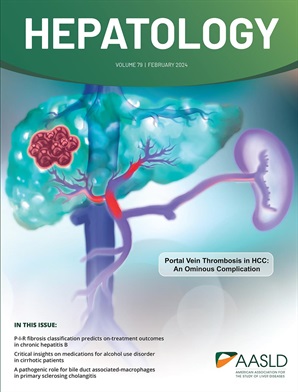肝切除术改变了肝癌小鼠模型中辅助抗pd -1的作用,但不影响新辅助的效果。
IF 15.8
1区 医学
Q1 GASTROENTEROLOGY & HEPATOLOGY
引用次数: 0
摘要
免疫检查点抑制剂(ICI)已经改变了晚期肝细胞癌(HCC)的治疗,但它们在围手术期的应用仍未得到充分探讨。本研究旨在探讨肝切除术对肿瘤微环境的影响,并评估新辅助或辅助抗pd -1治疗是否能改善治疗结果。方法采用小鼠原位肝癌模型,行非治愈性部分肝切除术,切除非荷瘤肝叶,给予抗pd -1作为新辅助或辅助治疗。在另一项单独的实验中,进行了根治性肝切除术(切除荷瘤叶)来评估复发和生存。结果抗pd -1治疗在非手术环境下显著降低肿瘤生长(p=0.0094),但在辅助环境下其疗效消失。这种损失与效应记忆CD103 + CD8 + T细胞的浸润减少、衰竭标志物(TIM-3、LAG-3)的表达增加和髓源性抑制细胞(MDSC)的积累有关。手术时MDSC的消耗提高了辅助治疗的效果(p=0.0084),并延迟了辅助治疗的ICI部分恢复反应,表明术后存在暂时的免疫抑制窗口期。相比之下,新辅助抗pd -1治疗显著降低肿瘤负荷(p=0.0005),增强免疫细胞浸润,增加CD8+细胞上关键激活标志物(Tbx21、Gzma、Cxcr6、Cd69)的表达。此外,与假手术治疗相比,新辅助治疗显著降低了复发率(35% vs 68%, p=0.0405),并提高了生存率(p=0.0373),这是辅助治疗无法达到的。结论肝部分切除术破坏了抗肿瘤免疫,限制了辅助ICI的疗效。与辅助免疫治疗相比,新辅助抗pd -1免疫治疗在增强免疫反应和减少HCC复发方面提供了优越的策略。本文章由计算机程序翻译,如有差异,请以英文原文为准。
Hepatectomy alters adjuvant anti-PD-1 action in a mouse model of HCC but does not compromise neoadjuvant efficacy.
BACKGROUND AIMS
Immune checkpoint inhibitors (ICI) have transformed the management of advanced hepatocellular carcinoma (HCC), yet their integration in the perioperative setting remains insufficiently explored. This study aims to investigate the effect of hepatectomy on the tumor microenvironment and assess whether neoadjuvant or adjuvant anti-PD-1 therapy offers improved therapeutic outcomes.
METHODS
Using a murine orthotopic HCC model, a non-curative partial hepatectomy was performed, removing a non-tumor-bearing lobe with anti-PD-1 administered as neoadjuvant or adjuvant therapy. In a separate experiment, curative hepatectomy (resection of the tumor-bearing lobe) was performed to evaluate recurrence and survival.
RESULTS
Anti-PD-1 therapy significantly reduced tumor growth in non-surgical settings (p=0.0094), but its efficacy was lost in the adjuvant setting. This loss correlates with reduced infiltration of effector memory CD103⁺CD8⁺ T cells, increased expression of exhaustion markers (TIM-3, LAG-3), and accumulation of myeloid-derived suppressor cells (MDSC). MDSC depletion at the time of surgery improved adjuvant efficacy (p=0.0084), and delaying adjuvant ICI partially rescued responses, indicating a temporary postoperative immunosuppressive window. By contrast, neoadjuvant anti-PD-1 therapy significantly reduced tumor burden (p=0.0005), enhanced immune cell infiltration, and increased the expression of key activation markers on CD8+ cells (Tbx21, Gzma, Cxcr6, Cd69). Moreover, neoadjuvant treatment significantly reduced recurrence rates compared to sham treatment (35% vs. 68%, p=0.0405) and improved survival (p=0.0373), which was not achieved with adjuvant therapy.
CONCLUSIONS
Partial hepatectomy disrupts antitumor immunity and limits adjuvant ICI efficacy. Neoadjuvant anti-PD-1 immunotherapy offers a superior strategy compared to adjuvant immunotherapy in enhancing immune responses and reducing HCC recurrence.
求助全文
通过发布文献求助,成功后即可免费获取论文全文。
去求助
来源期刊

Hepatology
医学-胃肠肝病学
CiteScore
27.50
自引率
3.70%
发文量
609
审稿时长
1 months
期刊介绍:
HEPATOLOGY is recognized as the leading publication in the field of liver disease. It features original, peer-reviewed articles covering various aspects of liver structure, function, and disease. The journal's distinguished Editorial Board carefully selects the best articles each month, focusing on topics including immunology, chronic hepatitis, viral hepatitis, cirrhosis, genetic and metabolic liver diseases, liver cancer, and drug metabolism.
 求助内容:
求助内容: 应助结果提醒方式:
应助结果提醒方式:


